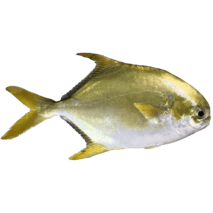Most of us are always inquisitive-how the luscious golden pomfret lands on our table; is it caught from its usual habitat, or is it a product of today’s advanced aquaculture. With increasing demand and its popularity as a type of fish, the origin trace-the viability of farming practices-becomes vital to quote what it holds for the future of the seafood industry.
Aquaculture for the golden pomfret is mainly due to the high demand consumers have for this species. Due to advances in aquaculture, this fish is now reared in controlled environments with assurances of quality and sustainability.
Interested in reading further? Let us find more about the farming saga of golden pomfret.

Overview of Golden Pomfret Farming
Golden pomfret is considered one of the most valuable fish species, having a mild taste, firm texture, and a good nutritional profile. Unlike most wild-caught fish, golden pomfret does well in aquaculture systems and has become one of the most reliable seafood species in global markets. Farming responds to the emerging demand for sustainable seafood production.
Historical Background of Golden Pomfret Aquaculture
Large-scale farming of golden pomfret started in 2002 after the scientists successfully developed the artificial breeding technique. This was a go-ahead toward large-scale farming, particularly in China, where this species had been one of the staple aquaculture products within its industry. As a fact, these innovations paved the way for golden pomfret transitioning from wild-caught to mainly farmed.

Current Farming Practices and Techniques
Golden pomfret farming is embracing newer methods of rearing that reduce environmental impacts with enhanced growth. The good practices will include:
- Offshore cage farming: Good area; natural conditions to grow
- High-density stocking: The initial stocking of 40-50 fry/cu m for better survival rate.
- Special feed: a diet with a balanced composition using formulated pellets and with naturally occurring food items.
These practices ensure that there is fast growth, with the fish attaining market size within as short a period as 5–6 months if at an optimum level.

Main sourcing regions for golden pomfret farming
China leads global production of golden pomfret, with significant activity in these regions:
- Hainan Province
- Guangdong Province
- Guangxi Province -especially the City of Beihai
- Fujian Province
Recently, Beihai was given 32.56 million yuan by the regional government to further develop deep-water net technology and support the expansion of the golden pomfret farming industry. This would enhance farming activities to a level where the production of up to 30,000 tonnes of golden pomfret per year is possible. Beihai is thus a good location for seafood importers in search of stable, quality sources of golden pomfret in 2024 and beyond.

Statistics of Production and Economic Effect
The aquaculture of golden pomfret is an industry worth billions of yuan and sustains thousands of families. Following are some key statistics:
- 2019 Production: 168,000 tons
- 2020 Production: 200,000 tons-record
- 2021 Production: 180,000 tons-a little less than in 2020, due to problems in breeding.
This is a more than CNY 20 billion-valued industry annually, directly employing 100,000 workers and indirectly supporting over 1 million people.
| Year | Production (tons) | Economic Value (CNY) |
|---|---|---|
| 2019 | 168,000 | N/A |
| 2020 | 200,000 | N/A |
| 2021 | 180,000 | >20 billion |
Market Trends and Consumer Demand
The golden pomfret is a fish that is in great demand, not only for its taste but also for its health benefits. It has a lot of omega-3 fatty acids in the form of DHA and EPA, and hence it finds its demand among health-conscious people worldwide. It is quite popular in Asian cuisine and is usually steamed, grilled, or fried.

Challenges Facing the Golden Pomfret Farming Industry
Despite the success, some headaches that the industry needs to bear with include:
- Seedling shortages: A reduction in the availability of seedlings disrupted production by 40%.
- Rising feed costs: Increasing costs dent profitability.
- Pandemic impacts: COVID-19 disrupted supply chains and reduced exports.
These need to be put into consideration if the industry is to thrive.
Future Prospects for Golden Pomfret Aquaculture
The future of golden pomfret farming looks bright, abetted by technological innovations with AI monitoring and alternative feeds to make the process much more efficient. However, the debate on sustainability issues will be ongoing as further emphasis is being placed on making sure that minimal impacts on the environment are reduced.
The greater percentage of golden pomfret supply in the world is contributed to through aquaculture, making up over 80 percent, while the wild catch contributing to this is very minimal compared to the volumes being farmed.
What are the Benefits of Golden Pomfret Culturing?
Firstly, it contributes towards economic development in that farming this specimen assures supply or guarantees, thereby minimizing catches in the wild.

Where Is the Main Culturing of Golden Pomfret Done?
China is the leading producer in the world, and golden pomfret culture in China is mainly along its coastal provinces like Guangdong, Guangxi, and Hainan.
How Does the Golden Pomfret Grow in Aquaculture?
It reaches market size, between 500 to 800 grams, in only 5 or 6 months when raised under perfect conditions.
Is Golden Pomfret Aquaculture Seriously Posing Any Sustainability Concern?
Yes, there is waste management and feeds and impacts on the ecosystems. These are continually being worked on with new more environmentally friendly farming methodologies.

Conclusion
Golden pomfret farming has just marked the frontiers of a new wave in seafood production. This combination of innovation and sustainability is surely able to meet world needs with much promise. But ahead of that path lies much environmental and resource management concerns if it has to succeed over a long period.


